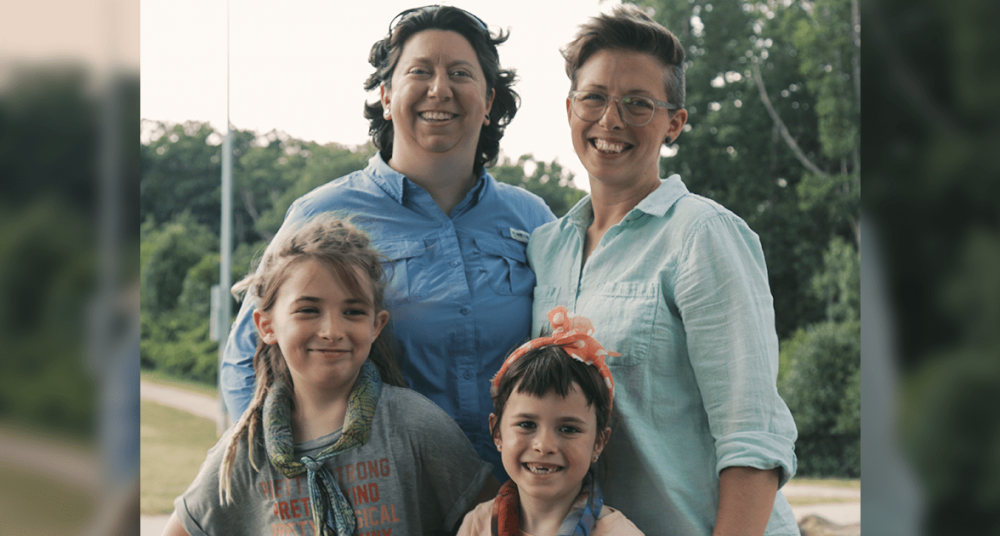District court allows lawsuit to go forward challenging HHS waiver that permits a government-funded South Carolina foster care agency to reject applications from same-sex parents
(Greenville, May 8, 2020) – A U.S. District Court today denied an effort by the U.S. Department of Health and Human Services (HHS) and the state of South Carolina to dismiss a lawsuit filed by Lambda Legal, the ACLU, the ACLU of South Carolina and South Carolina Equality on behalf of a married lesbian couple,Eden Rogers and Brandy Welch. The couple was turned away by a government-funded foster care agency because they, as a lesbian couple, did not meet the agency’s religious criteria, which excludes prospective foster parents who are not evangelical Protestant Christian or who are same-sex couples of any faith.
“We are very excited to hear our case is going forward in court. There are many children in South Carolina that need foster homes, and we remain hopeful that couples like us can provide children a lovely home without being rejected or discriminated against,” said Brandy Welch and Eden Rogers.
Miracle Hill Ministries, South Carolina’s largest state-contracted foster care agency, denied Eden and Brandy’s application to serve as foster parents after South Carolina requested and HHS granted a waiver of federal nondiscrimination rules for federally funded agencies. In so doing, HHS and the State authorized and enabled taxpayer-funded foster care agencies to use religious criteria to exclude families based on their faith and sexual orientation.
“This is great news, and we look forward to Eden’s and Brandy’s day in court,” said Currey Cook, Counsel and Director of the Youth In Out-Of-Home Care Project at Lambda Legal. “No child in foster care who can’t safely be with their family should be denied the opportunity of a loving and nurturing foster home simply because the prospective parents don’t meet a taxpayer-funded agency’s religious litmus test. Eden’s and Brandy’s faith and sexual orientation have no bearing on their suitability to provide a home for children in need.”
“The federal government told the over 400,000 children in our nation’s foster care system that the religious beliefs of the agencies caring for them come before their needs. Today a federal court pushed back, saying that allowing taxpayer-funded agencies to turn away qualified families because of an agency’s religious criteria violates the Constitution,” said Leslie Cooper, deputy director for the ACLU’s LGBT & HIV Project.
“The U.S. Supreme Court will have an opportunity to weigh in on taxpayer-funded agencies discriminating based on their religious beliefs next term. The Court will hear a case in which a foster care agency claims that the City of Philadelphia’s nondiscrimination requirement — which prohibits City-contracted foster care agencies from discriminating against same-sex couples — violates the agency’s Constitutional rights.
While these cases involve child welfare, a decision from the high court could impact a variety of taxpayer-fund.
“The thousands of children in South Carolina’s foster care system are the ones who suffer most when agencies like Miracle Hill use religion as a license to discriminate against people who can provide a loving, nurturing home,” said Susan Dunn, legal director for the ACLU of South Carolina. “By allowing this practice to continue, the state of South Carolina and U.S. Department of Health and Human Services have failed the vulnerable children they are supposed to be helping. We are excited this case is moving ahead and look forward to continuing the fight against government using religion to deprive children of loving homes.”
HHS and South Carolina fund Miracle Hill with taxpayer money to perform child welfare services for children in state care even though Miracle Hill made clear that it excludes families based on Miracle “Hill’s religious beliefs. In order to foster through Miracle Hill, a family must agree with Miracle Hill’s “doctrinal statement,” including “that God’s design for marriage is the legal joining of one man and one woman in a life-long covenant relationship” – a requirement that excludes same-sex couples of any faith. HHS and South Carolina have sanctioned and facilitated the use of these religious criteria in the public child welfare system.
Lambda Legal, ACLU, ACLU South Carolina, and South Carolina Equality Coalition filed the lawsuit a year ago in U.S. District Court for the District of South Carolina on behalf of Eden and Brandy. The lawsuit claims that HHS, the HHS Administration for Children and Families, certain HHS officials, South Carolina Governor Henry McMaster, and the Director of the South Carolina Department of Social Services are violating the Establishment Clause and the Equal Protection guarantees of the U.S Constitution by authorizing and enabling the use of religious criteria by Miracle Hill to screen out would-be foster families because of their faith or sexual orientation.
In today’s ruling, the court agreed that Eden and Brandy’s allegations of harm from being discriminatorily excluded from participating in the State foster care program were the result of actions by the government defendants and allowed the case to go forward on their claims that the defendants have violated the Establishment Clause and have discriminated on the basis of sexual orientation.
